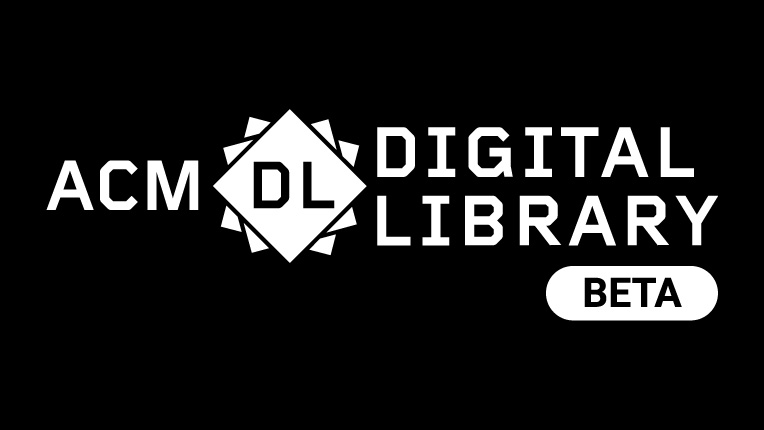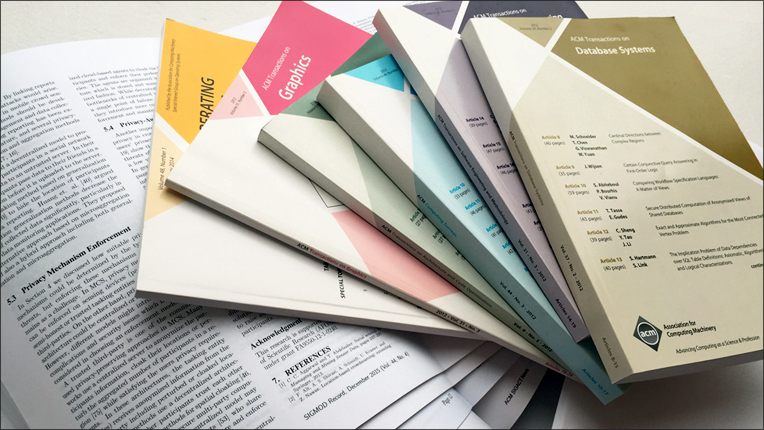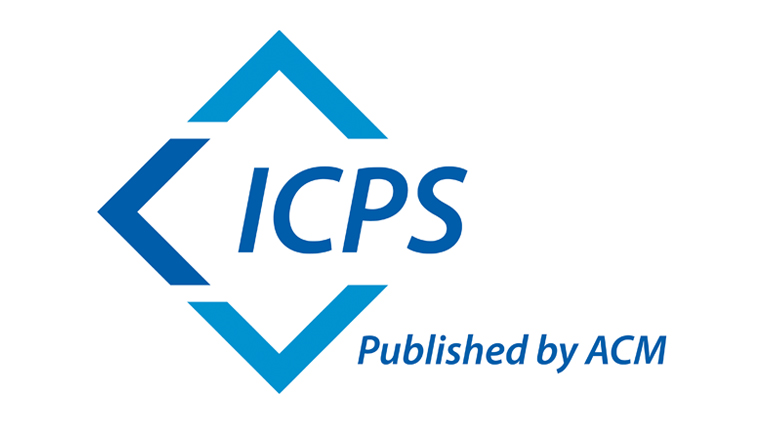The Blue Diamond - March 2019

CONTENTS AT A GLANCE:
- Introduction: Welcome to the March Issue
- Preview the ACM Digital Library Beta Site
- Author Templates
- New Publications Policy on Conflict of Interest
- New Publications Policy on Withdrawal/Correction/Retraction/Removal of Works from ACM Publications and DL
- New ACM Journals Accepting Submissions
- Call for Nominations for ICPS EIC
- Publications Board Meeting Highlights
The Blue Diamond March 2019
Welcome to the March 2019 issue of ACM's new Publications Newsletter, The Blue Diamond. I'd like to thank those of you who provided feedback on the inaugural issue. Based on your feedback, it's clear the newsletter is serving a genuine need for more information from ACM about our various publications-related initiatives, so it appears the newsletter is off to a good start! Please continue to send feedback on the content and format of the newsletter as well as suggestions for topics to cover in future issues, so we can continue to ensure that new issues are relevant for our readership.
This issue contains a number of articles that are extremely relevant to the ACM community, including an update on the status of the launch of the new Digital Library platform (DL Next); an update on The ACM Publishing System (TAPS); new Publications Policies on Conflicts of Interest and the Withdrawal, Correction, Retraction, and Removal of Articles from ACM Publications and the ACM Digital Library; new publications on Cybersecurity, Internet of Things, Data Science, Healthcare Computing, and Digital Government; and highlights from the recent ACM Publications Board meeting held in New York City on January 31-February 1, 2019.
I hope you enjoy this issue and if you have any questions, please don't hesitate to contact me!
Scott Delman
Director of Publications
Association for Computing Machinery
Email: [email protected]
Preview the ACM Digital Library Beta Site

During the past several months, we have been working to transform the ACM Digital Library into a rich and interactive tool. We invite you to explore the beta version at https://DLnext.acm.org, so that you can preview the enhancements, features and functionality we're building into the new ACM DL.
You also have the option to preview and work with a variety of new DL pages during your normal usage of the ACM DL. The pop-up message, "Check out a preview of the Next DL," indicates that a beta page is available. Look for the "Feedback" button pinned to the bottom-left of the new pages to tell us what you think.
Our latest rollout includes a number of features and pages, including enhanced search facets, citation exports, bibliometrics, clickable references, an "about" page with a real-time activity view, conference pages, SIG pages, a custom collection page, and others.
The new faceted search makes refining your discovery of articles easy and efficient. Search on subject, author, title, media format, content type, and more using simple filters aligned beside the search results. Navigate easily from article to article. Select multiple items and apply a function to them, such as exporting citations. And you'll find improved integration with a variety of reference software packages.
You'll also find better integration with Google Scholar and your favorite social media platforms.
The clean, modern design of the new DL is responsive, providing an exceptional reading experience on a variety of devices.
Please take a look at the new DL beta site, https://DLnext.acm.org, on your phone as well as your desktop, and forward your valuable insights by using the feedback button or sending an email to [email protected] or via Twitter @ACMDL.
Author Templates
Over the past year, ACM has been trialing a new format for author content that changes the way we archive publications. The new approach archives publications in the XML based JATS/BITS format and requires authors to make some changes to how they prepare publications. There are numerous benefits to this approach, including de-coupling publication content from PDF, providing more flexibility and accessibility in reading formats, and creating a more resilient archive format. To see how this new workflow produces PDF and responsive HTML formats, see this recent publication using the new format: https://dl.acm.org/citation.cfm?id=3299096.
Key Points:
- The new ACM workflow for publications is an entirely new approach: this fundamentally changes how authors will work with templates and "camera ready" submissions.
- The new workflow separates content from presentation, a crucial step forward to a new archive format.
- This new archive format allows the Digital Library to become more flexible and resilient for the future.
Forget everything you know about "templates." Previous version of Word template (2017 Master Article Template) using macros proved unsuitable, and in collaboration with authors and volunteers a new workflow has been established that should make this process easier for authors, proceedings chairs, and conference organizers. The new workflow for preparing publications completely replaces the previous templates and formatting instructions. The new workflow begins with a "review format" that is lightweight and requires minimal author effort to prepare. Accepted submissions are then converted to a "final submission" format that prepares the content for publication. Final submissions are processed using a new production platform that automates much of the publication work, allowing authors to ensure their content is correctly captured and review how their publication will appear in different formats such as PDF and responsive HTML.
A major benefit of this new workflow is that it separates publication content from presentation. Archiving publications in the JATS/BITS format give authors a range of features not possible for current publications archived as PDF. JATS/BITS allows publications to be viewed dynamically in many different formats, and the list can be expanded in the future to keep up with innovation in presentation formats, accessibility, and reading devices. Given this change in how we prepare publications, "camera ready" becomes an obsolete term. There are also improvements in publication accessibility for authors and readers. Recent improvements in how the new workflow is implemented makes it easier for authors to prepare publications using existing Word functionality. The new platform transforms source files to create accessible output formats which give your articles a wider audience.
The new archive format fundamentally changes and future-proofs ACM publications. Moving to publications stored in the JATS/BITS format is a significant step, and requires a shift in our publication culture. Although there is an initial investment authors must make with respect to workload, the benefits significantly outweigh these costs long term. Storing publications in a raw form, as text and markup, makes it possible to ensure the content of our publications outlives PDF. It's easy to list obsolete viewing platforms, how will we look back on PDF in 100 years? Changing the way we archive publications is an important step to ensure our contributions to knowledge are preserved well beyond our lifetimes.
You can find more information about the new proceedings formats here: https://www.acm.org/publications/proceedings-template.
You can find more information about the new workflow for publications here: https://www.acm.org/publications/taps/word-template-workflow.
New Publications Policy on Conflict of Interest
ACM's recently released Conflict of Interest policy applies to any material formally reviewed or refereed as per ACM policy, including awards based on content published in ACM venues; and authors, reviewers, editors, conference program committee members, judges, and other persons associated with ACM-published materials. This comprehensive policy details the factors that constitute a conflict of interest (COI) for ACM publications; who is responsible for identifying and reporting potential COIs; and how a potential COI should be managed.
The ACM Publications Board spearheaded the effort in crafting this all-inclusive COI policy—a yearlong endeavor informed by significant feedback, insight, and experiences from ACM leadership, journal/Transactions editors, SIG leaders, and Committee on Professional Ethics (COPE) members.
The goal of this project was to develop one standardized umbrella COI policy that would serve all ACM stakeholders. The policy provides specific guidelines for common instances with the goal of assisting in the process of identifying and resolving potential conflicts of interest. It is also flexible and accommodating, noting how the policy can be augmented, and how exceptions may be approved.
New Publications Policy on Withdrawal/Correction/Retraction/Removal of Works from ACM Publications and DL
As a general policy, ACM sets an extremely high threshold for removal of any items from ACM publications and the ACM Digital Library. Works published in the ACM Digital Library are considered the definitive Version of Record; the date the work first appears in the DL is the official publication date of the work. Removal of works from the Digital Library is reserved for only the most serious of circumstances, including when such removal is required to comply with the law or court orders directing ACM to remove such Works in their entirety from publication. Even in such circumstances, work citation pages are retained in the ACM Digital Library to provide a historical record that such works did exist and were published in the ACM Digital Library. There are four principal types of actions that can be taken to works submitted to ACM Publications for review and/or published in the ACM Digital Library. They are: Withdrawal, Correction, Retraction, and Removal.
This policy defines the circumstances and conditions under which each of the above actions can be taken; who provides input and makes the final determination regarding each possible action; the process followed by ACM to determine if such actions are warranted, including the possibility of an appeals process; and what specific actions are taken by ACM after a final determination has been made.
For the full policy please visit https://www.acm.org/publications/policies/retraction-policy.
New ACM Journals Accepting Submissions

ACM Digital Threats: Research and Practice (DTRAP) targets the prevention, identification, mitigation, and elimination of digital threats, aiming to bridge the gap between academic research and industry practice. It is accepting submissions on extant digital threats, rather than laboratory models of potential threats. https://dtrap.acm.org
ACM Transactions on Data Science (TDS) includes cross-disciplinary innovative research ideas, algorithms, systems, theory and applications on data science, including data cleaning, transformation, representation, integration, indexing, modeling, analysis, visualization, and interpretation while retaining privacy, fairness, provenance, transparency, and provision of social benefit, within the context of big data. https://tds.acm.org
ACM Transactions on Internet of Things (TIOT) publishes novel research contributions and experience reports in several research domains whose synergy and interrelations enable the IoT vision. TIOT focuses on system designs, end-to-end architectures, and enabling technologies, and on publishing results and insights corroborated by a strong experimental component. https://tiot.acm.org
ACM Transactions on Computing for Healthcare (HEALTH) publishes research papers, survey papers, and challenge papers that have scientific and technological results pertaining to how computing is improving healthcare. HEALTH is multidisciplinary, intersecting CS, ECE, mechanical engineering, biomedical engineering, behavioral and social science, psychology, and the health field, in general. https://health.acm.org
ACM Digital Government: Research and Practice (DGOV) is an interdisciplinary journal on the potential and impact of technology on governance innovations and its transformation of public institutions. It promotes applied and empirical research from academics, practitioners, designers, and technologists, using political, policy, social, computer, and data sciences methodologies. https://dgov.acm.org
Call for Nominations for ICPS EIC

The term of the current Editor-in-Chief (EiC) of the ACM International Conference Proceedings Series (ICPS) is coming to an end, and the ACM Publications Board has set up a search committee to assist the Board in selecting the next EiC.
Nominations, including self-nominations, are invited for a three-year term as ICPS EiC, beginning on July 1, 2019. The EiC appointment may be renewed at most one time. This is an entirely voluntary position, but ACM will provide appropriate administrative support. The 328 applications received in FY 2018 for ICPS resulted in the addition of 247 proceedings volumes to the ACM Digital Library.
The EiC is responsible for maintaining the highest editorial quality, for setting technical direction of the series, and for maintaining a reasonable pipeline of proceedings for publication. He/she has final say on acceptance of proceedings, size of the Editorial Board, and appointment of Editorial Board Members. The EiC is expected to adhere to the commitments expressed in the policy on Roles and Responsibilities in ACM Publishing. For more information about the role of the EiC, see ACM's Evaluation Criteria for Editors-in-Chief.
Nominations should include a vita along with a brief statement of why the nominee should be considered. Self-nominations are encouraged, and should include a statement of the candidate's vision for the future development of ICPS. The deadline for submitting nominations is 30 April 2019, although nominations will continue to be accepted until the position is filled.
Please send all nominations to the search committee chair, Sartaj Sahni.
The search committee members are:
- Sartaj Sahni (University of Florida), Chair
- Antonio Corrardi (University of Bologna)
- Marios Dikaiakos (University of Cyprus)
- Yuanyuan Yang (SUNY, Stony Brook)
- Albert Zomaya (University of Sydney)
Publications Board Meeting Highlights
The ACM Publications Board has overall responsibility for ACM's Publications portfolio, Publications-related policies, and the strategic direction of ACM's Publications program. The Pubs Board is composed entirely of volunteers from the computing community and is one of the most important parts of ACM's governance structure. The Pubs Board is a collaborative group that works closely with other ACM boards, committees, ACM staff, and stakeholders from the community. A significant part of the Board's activities are carried out by a group of committees focused on the following areas:
- New Publications
- Assessment and Search
- Ethics and Plagiarism
- Digital Library
- Conferences
- PACM Steering Committee
- Business Working Group
The Board meets each month by conference call to discuss a wide variety of publications-related topics and in person three times per year, during which some of the most important topics are discussed and voted on by the Board. To ensure that we can communicate the highlights from these in-person meetings to you, this newsletter will appear after each of these three in-person meetings.
The most recent in-person meeting took place January 31-February 1, 2019 in New York City. The highlights from that meeting are:
- ACM CEO Vicki Hanson gave the Board an overview of ACM activities, including some of the work being done by the ACM Practitioners Board, including the creation of several new practitioner-focused conferences in the areas of Financial Technologies, CS and the Law, Data Science, and Human-Centered Machine Learning.
- The ACM Publications Board was provided an update on several new publication proposals under consideration on Quantum Computing, Evolutionary Learning and Optimization, Assured Computing, Gaming Review, Neuromorphic Computing, Collective Intelligence, and several other areas where ACM is interested in starting new publications.
- Several new Publications policy initiatives, including new policies on Name Changes in ACM Publications and the ACM Digital Library; Document Retention; Digital Artifacts; Harassment in Publications-related Activities; and Plagiarism were presented. As these policies are ratified by the Publications Board, we will provide the complete policies on the ACM Publications website and provide summaries of these new policies in future issues of this newsletter. See the stories in this issue about the new ACM Publications Conflict of Interest policy and the new ACM Publications Policy on the Withdrawal, Correction, Retraction, and Removal of Articles from ACM Publications and the ACM DL.
- An update was given on the new MS-Word authoring templates for ACM conference proceedings and journals. (See the story in this issue.)
- An update and discussion took place regarding ACM's approach to transitioning ACM Publications to an Open Access model of publication. It was announced that the new and forthcoming journal Digital Government: Research & Practice will be launched as Gold Open Access later in 2019 or early 2020.
- A summary and discussion of the newly announced PLAN S in Europe was provided. A detailed update on ACM's strategy towards Plan S and other Open Access initiatives is forthcoming in the next issue of this newsletter.
- The Board spent a full day engaged in a Journals Development Workshop evaluating existing ACM journal titles with the ultimate goal to ensure that they are serving the widest possible readership, remain highly relevant and high-quality, and in general provide comprehensive coverage of the entire computing discipline. One of the things coming out of the meeting was a clear need to grow and strengthen ACM's publishing portfolio in the area of Artificial Intelligence. Other areas for growth include Computing Ethics and survey and review type publications.
- Prior to the January 31 meeting, the Digital Library Committee, co-chaired by Ed Fox and Michael Nelson, conducted a full day meeting to discuss a variety of topics relating to the future of the ACM Digital Library. Topics such as reproducibility in computing research, pre-print services, features and functionality of the next-generation DL, and other topics were covered. A more detailed overview will be provided in the next issue of the Blue Diamond.
Please don't hesitate to reach out if you have questions about this most recent meeting.
Association for Computing Machinery
2 Penn Plaza, suite 701, New York, NY 10121
Copyright © 2019, ACM, Inc. All rights reserved